 HC’s reversal of the disqualification of Delhi MLAs flags the need to respect principles of democracy, uphold due process.
HC’s reversal of the disqualification of Delhi MLAs flags the need to respect principles of democracy, uphold due process.
The Delhi High Court has done well to set aside the January order of the Election Commission of India (EC) that disqualified 20 Delhi MLAs, all from the Aam Aadmi Party, for holding an “office of profit”. This newspaper, among others, had pointed out then that the EC failed to uphold due process while issuing the order.
In January, the EC had held that the MLAs were liable for disqualification since the post of parliamentary secretary to which they had been appointed by the Delhi government in 2015, could be deemed an “office of profit”. As per the law, a legislator is not allowed to occupy another office that entitles him to a salary and other perks. The Delhi government’s attempt to have legislative exemption for its appointments failed since the office of the Lieutenant Governor refused to endorse the amendment proposed to the the Delhi Members of Legislative Assembly (Removal of Disqualification) Act. By the time a complaint was filed before the EC, the Delhi HC had set aside the appointments, which formed the ground for AAP’s submission before the Commission that the issue had become void. But the EC refused to close the case and worse, ruled against the legislators without giving them a hearing. While the law is clear on disallowing a legislator from holding an office of profit, many state legislatures have amended it to allow MLAs from holding posts like legislative secretaries. Delhi too would have resolved the issue in a similar manner if the state government and the Centre had a cordial relationship. Against this background, the EC’s unilateral action to disqualify the legislators was an extreme step, one which failed to match the high standards of conduct it has set over the years.
The bar to remove an elected legislator, who represents the people’s mandate, has to be very high and a disqualification should be sought only after due process and as a last resort. In this case, the EC failed to uphold the principles of natural justice and issued an order without even allowing the legislators to defend themselves, a failure the HC flagged on Friday. Though many, including some former election commissioners, had questioned the wisdom underlining the order, the Commission refused to retract. The President’s office could have raised questions about the Commission’s order, instead it chose to ride with the EC: President Ram Nath Kovind failed when he had to deal with an executive directive that threatened to undermine electoral democracy. The Delhi HC has now stepped in to undo the damage done by the EC and the President’s office to democratic principles and processes. The EC now has to hear the case again and hopefully, will arrive at a more reasonable conclusion.